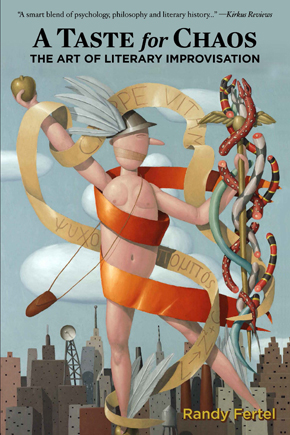Adventures in improvising
by Randy FertelThe single rule in contemporary comic improv sketches, is, Yes, and… If your partner starts a sketch saying, Hey, I just met a green-skinned alien!, you must build on that premise; for example play the skincare guru and ask, Dry, normal, or oily? To scoff and say You’re nuts! There’s no such thing! is to break that cardinal rule. In improvisational theatre, says Keith Johnstone, renowned creator of Theatresports, “the first player to kill an idea loses. There are people who prefer to say ‘Yes,’ and there are people who prefer to say ‘No.’ Those who say ‘Yes’ are rewarded by the adventures they have, and those that say ‘No’ are rewarded by the safety they attain.”
I began studying the literary equivalent of improvisation forty-two years ago for my doctoral dissertation (imagine writing about spontaneity at Harvard – the closest I’ve ever come to living an oxymoron). Literary improvisations are texts that claim to be artless, impromptu, careless, and created off-the-cuff. Think Jack Kerouac’s Benzedrine-fuelled ‘kickwriting’ versus the self-conscious craftsmanship of Vladimir Nabokov, who claimed “my pencils outlast their erasers.” My argument is that works of art like Kerouac’s, while claiming to be chaotic and sui-generis, are alike in style, form and theme. Improvisations invite us to be alert to the world around us. They demonstrate how in their ride on the thin ice of the un/fore/seen — im/pro/visation.
What began as my dissertation has now culminated in a book – a 40-year record of my own improvisational adventures, of saying Yes a lot. Rather than staying planted within the disciplinary and period cubbyholes literary criticism demands, I let ‘my’ improvisers (as I came to call them) lead me, following threads and links to other self-styled improvisers from many periods, Homeric Greece to the present. Claiming to proceed without the benefit of care, craft and rationality, improvisations challenge the reigning rationality of their day, offering whatever extra-rational faculty or device is available, be it the Muse’s inspiration, Horace’s “grace beyond the reach of art”, Coleridge’s opium-fuelled dream state (as in ‘Kubla Khan’), or Kerouac’s Benzedrine.
My approach to the sensibility of improvisation was inevitably multidisciplinary. Like the form itself I overstepped many boundaries. Through the lens of literary criticism, the first of the many disciplines I deployed, it was clear that improvisation scorns constraint. Besides disdaining what the literary canon defines as fit material or appropriate form, improv also scorns the methods and strict periods literary criticism itself relies on to know the canon. Literary criticism, based on some privileged, systematic rationality du jour, offers a monolithic approach to texts and to life. It offers readings that are comprehensive or absolute: the right reading.
By contrast, the multi- or interdisciplinary approach that improvisation invites offers explanations from many angles – intuitive, symbolic, mythic, historical, to name a few. Such explanations are self-consciously and avowedly contingent on the point of view adopted. None pretend to completeness. Explanations of a text that are polytropic do not come to identical conclusions, yet they do not contradict one another. With no reading privileged above another, they are complementary and syncretic. Such explanations are both/and rather than either/or. Like the Zen master who circles the Tao and sees it from many angles, this multidisciplinary approach adds up to more than any single reading.
Depending on the questions you ask, light is both particle and wave. Rabelais is both conservative Christian and, insofar as he urges us to embrace more of life, libertine Rabelaisian (a word that earned me the reproach in a graduate seminar that “anyone using the word hasn’t read Rabelais”). A close look at John Milton’s “unpremeditated verse” in Paradise Lost reveals the poet’s ambivalence toward inspiration: he longs to be “infused” by the spirit of the Holy Spirit; he also knows that such infusions might be like Satan’s, who inspires the war in heaven when he “infused / Bad influence” into the other archangels.
The Great Gatsby, a study in the lure of carelessness, involves Nick Carraway’s attempt, exhausted by the war, to do away with cares by being carried away by the Jazz Age. The lesson he learns is that we cannot do away with our cares, and that those who seem to, do so at their own moral peril. The casual, moneyed East is attractive because in “the West… an evening was hurried from phase to phase toward its close, in a continually disappointed anticipation or in sheer nervous dread of the moment itself.” Fitzgerald’s careless Easterners share with the improviser the ability to embrace the moment. But the novel asks the question: which way of life is finally more open to what Nick in his breathy, exhausted voice calls “the inexhaustible variety of life”?
Of course by following improvisers’ leads I broke the fundamental rule of academia. I didn’t stay fixed in my cubbyhole (English and American Romanticism). I didn’t become a master of some narrowly conceived field. Instead, I allowed myself to be mastered by the theme and the books I loved, inspired, just like my improvisers were, by a force outside myself.
Following many threads across national and disciplinary boundaries offered an education I had never imagined and came to relish. Improvisation became my vade mecum and boon companion. Whenever I became intensely interested in some new author or field, eventually I would see its ‘fit’ in my grasp of improvisation. Goethe tells Eckermann in their Conversations that you must use what you study if you want to retain it. That’s how my book functioned for me – as an omnium gatherum, a place to store everything I learned along the way. Easily more retentive than my memory banks, the book is now smarter than me.
While many of the book’s examples derive from the mainstream of literary tradition, improvisation is its own tradition, a current that flows alongside or underneath the mainstream. Improvisation is the disruptive shadow, in dialogue with the dominant culture, and hidden in plain sight.
Improvisations are a counter-current that ‘spins against’, in Melville’s words, the Western drive toward objective rationality. The spin of improvisation urges us to embrace subjectivity and some version of the irrational.”
I started out to define a kind of literature. Before I was done (or before improvisation was done with me), I came to define a state of being where our fundamental polarities contend. Eventually my adventure led to the recognition that I was looking at an alternative narrative of Western culture, less linear and more cyclical or spiral in nature. Improvisations are a counter-current that “spins against”, in Melville’s words, the Western drive toward objective rationality. The spin of improvisation urges us to embrace subjectivity and some version of the irrational, depending on what cultural moment it inhabits. In sum, the gesture of spontaneity leads to the effort to dismantle the entire edifice of authority. Improvisation and its subtle subversions challenge us: How do we make and judge value? How can we best know the world? How can we come to know all of it?
Beyond literature, my adventure pulled me into music, pop culture, and archives of television and movies. I compared Robert Altman’s studied roughness to David Mamet’s studied artificiality. I saw a connection between Johann Sebastian Bach’s insistence on effortful spontaneity, effortful effortlessness, with similar gestures by, in bandleader Paul Shaffer’s words, the “most ferocious barbarian of all”: James Brown. Were artists so heterogeneous ever so yoked? Here’s another pair: I saw in James Joyce’s celebration in Ulysses of the “thrown away” links to Louis Armstrong to whom historian Gunther Schuller attributes a “‘democratization’ of rhythmic values” – an embrace of weaker beats that traditional Western music by understating would in effect throw away.
If interpretation is about connecting dots, my book is a pointillist tapestry. What those dots figure is a celebration of life and an alertness to life. Urging that to be on our toes is the most fruitful attitude, improvisers’ essential lesson lies in their demonstration of the alertness that makes their ride on the thin ice of the present moment possible. Spontaneity is a call to attention, but a certain kind of attention: not the rigour, inflexibility, and discursiveness of logic and rationality – logic requires attention too, but an attention always half looking over its shoulder at some rulebook. Spontaneity urges instead an attitude that is open, fluid, immethodical, intuitive, with a penchant for metaphor and symbol, for connotation rather than denotation, for play, narrative and myth. In the political sphere, the idea often attributed to Thomas Jefferson that “the price of liberty is eternal vigilance” here applies. Alertness is essential to democracy too.
How can you stay alert in a cubbyhole? Alternatively, how can you stay in your cubbyhole if you are alert to the life that swirls around you as improvisers would have us do?
 Randy Fertel holds a Ph.D. in English and American Literature from Harvard University, where he received a student-voted teaching award. He has taught at Harvard, LeMoyne College, Tulane, and the New School for Social Research. His first book, The Gorilla Man and the Empress of Steak: A New Orleans Family Memoir, the tale of two distinctive people – his parents – and his efforts to survive them, is now in its third printing in paperback. His latest book, A Taste for Chaos: The Art of Literary Improvisation is published by Spring Journal Press. Read more.
Randy Fertel holds a Ph.D. in English and American Literature from Harvard University, where he received a student-voted teaching award. He has taught at Harvard, LeMoyne College, Tulane, and the New School for Social Research. His first book, The Gorilla Man and the Empress of Steak: A New Orleans Family Memoir, the tale of two distinctive people – his parents – and his efforts to survive them, is now in its third printing in paperback. His latest book, A Taste for Chaos: The Art of Literary Improvisation is published by Spring Journal Press. Read more.
fertel.com
@rfertel
Author portrait © Pableaux Johnson


